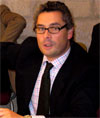Introducing Emmanuel Dupuy
 Emmanuel Dupuy (1971) was born in Forbach (France) and holds the French nationality. He has a broad educational background at universities of Bordeaux and Toulouse and l’Institut d’Etudes Politiques de Toulouse, covering History, Law, Political Science, Defence studies and European studies. Mr. Dupuy is currently President of l’Institut Prospective et Sécurité en Europe.
Emmanuel Dupuy (1971) was born in Forbach (France) and holds the French nationality. He has a broad educational background at universities of Bordeaux and Toulouse and l’Institut d’Etudes Politiques de Toulouse, covering History, Law, Political Science, Defence studies and European studies. Mr. Dupuy is currently President of l’Institut Prospective et Sécurité en Europe.
Furthermore, he works as journalist, consultant (Cabinet d’Ingénierie Stratégique pour la Sécurité), teacher in geopolitics (Institut d’Etudes des Relations Internationales) and researcher in geopolitical issues for various institutions linked to the French defence policy. One of his key interests is geopolitics of the Mediterranean region.
For his full background, please have a look at: Biography and Bibliography of Mr. Dupuy [137kB]
Geopolitical Passport
Your relationship with geopolitics
At what age did you discover geopolitics and what attracted you to it?
I should start by saying that, I have grown in it, in a certain way, having followed my father, during various stays abroad (USA, Italy, and Germany). After that, my interest for international relations and geopolitics was stressed by studies linked to the subject. Having a solid sense for associative implication, I started to think quite early during my studies that the generational gap between practise and theory was as important as the hiatus opposing the functionalist school and the geopolitical school of thoughts.
Which geopolitical topics have your focus and why did you choose especially these?
As geopolitics uses a multidisciplinary approach, all topics are much interconnected. You cannot decently study a topic of recent actuality, without having in mind strategy, intelligence, prospective, military sociology, theory of actors, international law, history, and of course geography, without whom geopolitics analysis does not exist…I do emphasize thought, on my personal belief, on the importance of prospective studies.
What do you consider your most important contribution to geopolitics?
I consider, most of all, that there is an urgent necessity to stress the issue on the emergency of bringing about a new generation of strategists and geopolitical analysts, who take the habit and the obligation of working, debating and therefore thinking together. This practical obligation is the key to the definition of an autonomous and convincing strategic thinking, on a national or larger scale.
My geopolitical preferences
What is your favourite definition of geopolitics?
I will give it in French, since language is somehow one of the most basic geopolitical tools: “La Géopolitique est la connaissance des grands équilibres et facteurs de tensions dans le champs des relations internationales, des questions stratégiques, des enjeux politiques, militaires, économiques et diplomatiques, en tenant compte des nouveaux paradigmes de la sécurité, qu’ils soient d’ordres systémiques, liés aux facteurs d’instabilités émergents ou liés aux menaces et méthodes asymétriques.”
Which geopolitical scientist do you admire the most?
Obviously, the French school of geopolitical analysis, which emerged after the Second World War (such as admiral Raoul Castex, who founded the Institut des Hautes Etudes de la Défense Nationale – IHEDN – in 1936) is still a very valuable reference, not to mention the actuality of Clausewitz…
What is your favourite geopolitical book?
There are so much, making a choice is quite impossible, I will just focus on the most recent book of interest, that I do consider a good and precise volume on the topic: “La guerre et la paix – approches contemporaines de la sécurité et de la stratégie” by Charles-Philippe David.
What is your favourite geopolitical website?
Again, dressing an improbable list is an impossible task. Many would be obviously missed. I just would like to stress the necessity to link both public and private, academic and journalistic and operational analysis, for one who would have to focus on a topic or a geographical area.
Our geopolitical future
In what direction(s) will geopolitical science be heading the coming decades?
Again, let me explain it in French, since we are dealing with a key issue for Peace and Stability…
En effet, le passage en revue des grands équilibres et déséquilibres de la scène internationale (du bilatéralisme au multilatéralisme « déséquilibré ») met en exergue tant les phénomènes de régionalisation et de régulation de la menace que la Géopolitique des grands blocs (Etats-Unis, Russie et CEI), pays émergents (Brics- Brésil, Inde, Chine) : prélude à une nouvelle guerre froide. Dans ce contexte, l’Union européenne pourra t-elle être un acteur global? Dans le même temps, la perspective de la présidence française de l’UE ( à partir du 1er juillet 2008), ainsi que les nouvelles frontières de la « Puissance » française, tendent à démontrer notre volontarime sur la scène internationale (Méditerranée, Afrique, Asie centrale, relations trans-atlantiques plus équilibrées).
Which geopolitical subject has been too little in the spotlight and needs further research?
Obviously, the Mediterranean basin and the so called Broader Middle East and North Africa, must be more analysed, notably on an academic level. That is why, the ambition of creating a Union for the Mediterranean is so vital.
Furthermore, the African continent, considering it more as an actor of international relations rather than a subject is also a key issue, on behalf of the need for more equilibrated North-South relations.
What will be the largest geopolitical challenge for the world in the 21st century?
Undoubtedly, human security, considering the link between “hard” and “soft” security and the rise of new threats, such as environmental, economical and alimentary insecurity, will be the milestone of geopolitical analysis. I want to add that current events, based on the fear of larger and larger parts of the world population not being able to project itself in the future, gives us a hint of the stress of the world, where wars can occur for food and water.
